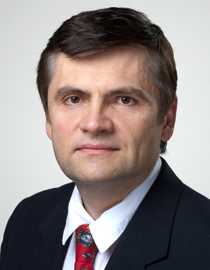Jun 4 2015
A multi-university team that includes Vladislav Yakovlev, professor in the Department of Biomedical Engineering at Texas A&M University, has been awarded a five-year grant, totaling more than $7 million from the Department of Defense’s (DOD) Multidisciplinary University Research Initiative (MURI) program.
 Vladislav Yakovlev
Vladislav Yakovlev
The grant, which was issued by the Air Force Office of Scientific Research, is in support of the project “Nanoelectropulse-induced electromechanical signaling and control of biological systems.” Yakovlev is joined by colleagues from Old Dominion University, the Massachusetts Institute of Technology and the University of Nevada School of Medicine.
Yakovlev’s portion of the project, for which he received more $1,050,000 in funding, will focus on the development of new approaches to microscopic imaging of electric fields across cellular membranes and elastic properties of those membranes.
The highly competitive MURI program supports research by teams of investigators that intersect more than one traditional science and engineering discipline in order to accelerate research progress. Most of the program's efforts involve researchers from multiple academic institutions and academic departments. The MURI program complements other DOD basic research efforts that support traditional, single-investigator university research grants by supporting multidisciplinary teams with larger and longer awards, in carefully chosen research topics identified for their potential for significant and sustained progress. MURI awards provide strong support for the education and training of graduate students in new, cutting-edge research.
The Army Research Office, the Air Force Office of Scientific Research, and the Office of Naval Research solicited proposals in 19 topics important to DOD and the military services and received a total of 289 white papers, which were followed by 76 proposals. The awards were selected based on merit review by a panel of experts and are subject to successful negotiation between the institution and DOD.
Yakovlev, who joined Texas A&M in 2012, has made many significant contributions to the field of optical instrumentation for biomedical sensing and imaging, including advancing the technology of ultrafast solid-state lasers, making it an indispensible tool for multiphoton microscopy, imaging and sensing.
Yakovlev holds the rank of Fellow in the Optical Society of America, the American Institute of Medical and Biological Engineering and the International Society for Optics and Photonics. He has published more than 100 papers in peer-reviewed journals, given 50 invited public presentations and more than 100 presentations at different conferences. He also has edited one book on the biochemical applications of nonlinear optical spectroscopy and contributed to several books as co-author.
Throughout the past 29 years, the DOD's MURI program has resulted in significant capabilities for our military forces and opened up entirely new lines of research. Examples include advances in laser frequency combs that have become the gold standard in frequency control for precision in navigation and targeting; atomic and molecular self assembly projects that have opened new possibilities for nano-manufacturing; the field of spintronics emerged from a MURI award on magnetic materials and devices research.